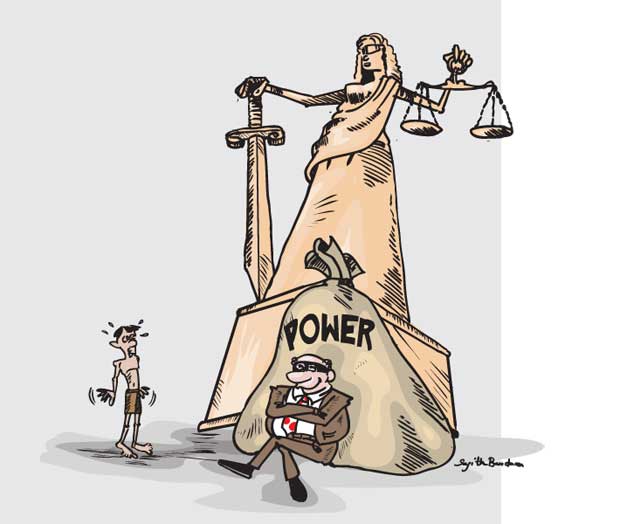Reply To:
Name - Reply Comment

Three similar incidents that took place last week and should have drawn the attention of civil rights movements and human rights champions were simply swept under the carpet without at least being subject to public discourse. This was so, probably due to the recurrence of such incidents in short frequencies in the recent times and deemed by the society as ‘normal.’
In the first incident, former President Mahinda Rajapaksa’s second son Yoshitha, who had been summoned by the CID to record a statement on July 27, had refused to turn up and requested for another day for the purpose.
He had been summoned to record a statement on the involvement of a vehicle allegedly belonging to the Siriliya Saviya organisation in the Waseem Thajudeen murder. In connection with the same vehicle, former President’s wife Shiranthi who was the head of the Siriliya Saviya too had been summoned by the CID on the following day, but she too appealed a deferral to record the statement.
In the third incident, a bigwig of the incumbent government of so-called ‘good governance’ acted in a similar manner. Former Finance Minister and current Foreign Affairs Minister Ravi Karunanayake who had been summoned by the Presidential Commission probing the controversial Central Bank bond issue had failed to appear before the commission on two consecutive days last week, and he is reportedly scheduled to appear tomorrow. He was summoned after it was revealed in witness testimony that the minister and his family leased out a luxury apartment at Monarch Residencies for eight months on a monthly rental of Rs.1.45 million which had been paid by Arjun Aloysius of Perpetual Treasuries Ltd. (PTL).
Can an ordinary citizen who is wanted by the police, CID, FCID or the Bribery Commission as an accused or witness in connection with a case involving a meager amount of money, tell those investigating instructions that he or she would come on a day other than the one fixed by the particular institution? Can an ordinary man refuse to appear in court or any commission saying he would come on another day? Never. Even if an ordinary man is not needed to be arrested but required to be grilled in connection with a crime or civil matter, he or she would be ‘taken in for questioning’ rather than to be summoned.
"It is clear that all are not treated alike. Some people can fix a date for the investigations against them, whereas some cannot"
But there is a category of men and women in this country whose refusal to appear before these institutions cannot be rebuffed by the investigators in turn. Here the investigators have to oblige. In January last year too, the former First Lady Shiranthi Rajapaksa who was summoned to appear before the Presidential Commission of Inquiry for Fraud and Corruption (PRECIFAC) in connection with a corruption case did not make an appearance on the scheduled day and got a deferral. In April last year, the officials of the PRECIFAC had told the media that former Defence Secretary Gotabaya Rajapaksa had taken up a tour to the United States avoiding PRECIFAC investigations against him. In June last year, UPFA MP Namal Rajapaksa failed to report to the Bribery Commission when summoned.
It is clear that all are not treated alike. Some people can fix a date for the investigations against them, whereas some cannot. Some people are invited or summoned to record their statements whereas others are taken in for questioning or sometimes kicked into the police jeep to be taken to the police station. Meanwhile, statements of some people on corruption charges are recorded in their houses or in places of their choice whereas the others are haulled into police stations. Some people are given medical certificates enabling them to be admitted to the prison hospital soon after they are remanded, a privilege enjoyed particularly by a certain class and a drama well exposed, but not even thought of to prevent. Some people are issued with fresh passports even before the office hours of the day, when they are caught with wrong passports at the airport whereas others would be behind bars for the same offence.
But the Constitution in its Chapter of Fundamental Rights says: “All persons are equal before the law and are entitled to equal protection of the law.” What a difference between the theory and practice!